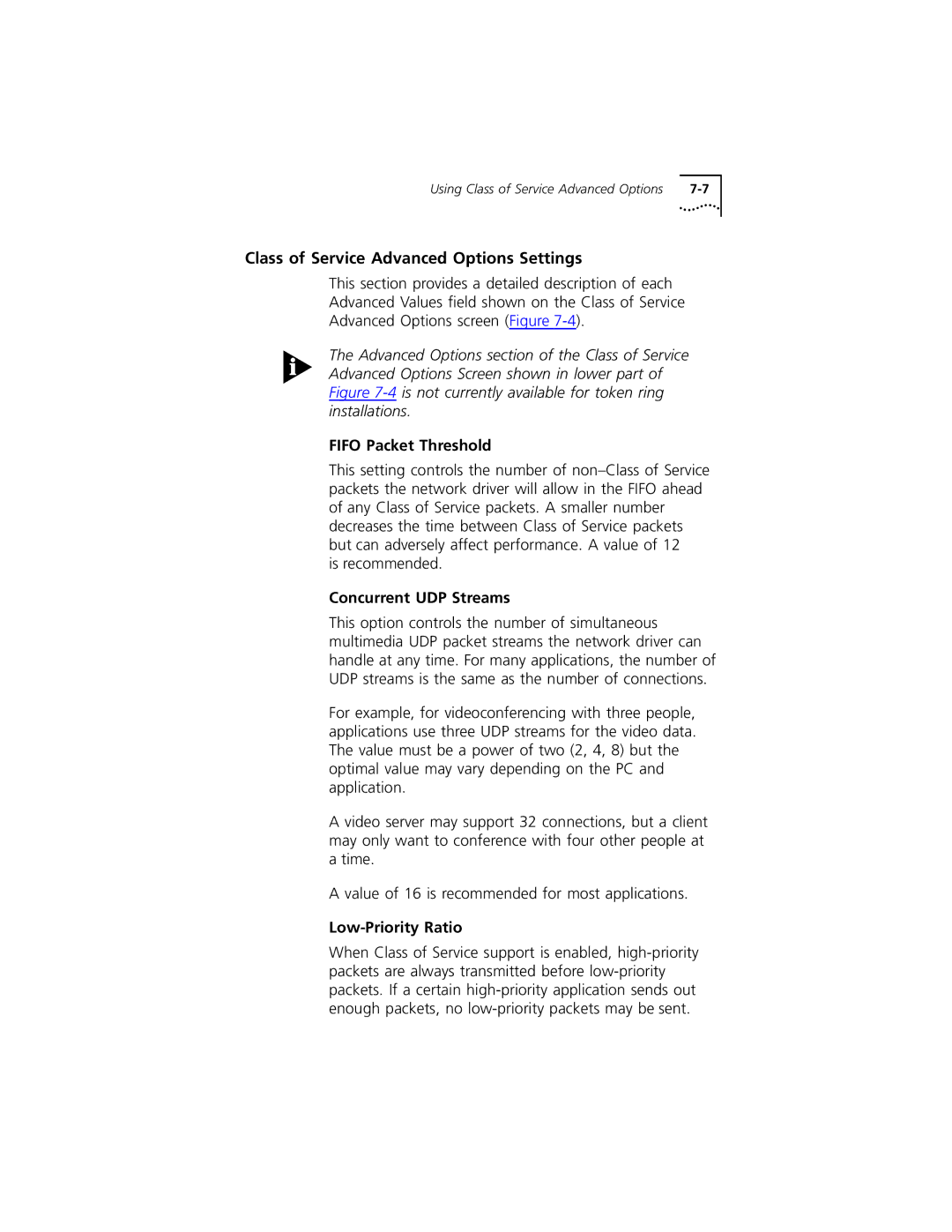Member of the high-performance TokenLink Velocity family
User Guide
For civilian agencies
For units of the Department of Defense
Lifetime Limited Warranty
Belgium, Netherlands, Luxembourg Sweden, Finland, Norway
Asia Italy, Greece, Spain, Portugal Malta
Australia, New Zealand
Japan
Contents
Installing a Network Driver for Windows NT
Configuring Dynamicaccess Class of Service
Specifications
Vii
Page
Figures
Page
Tables
Page
If you are looking for Turn to
How to Use This Guide
About this Guide
Introduction
Conventions
Icon Alerts you to
Convention Description
Parallel Tasking Architecture
High-Performance Features
DynamicAccess Class of Service
Introduction
Full-Duplex/Dedicated Token Ring Support
Other Features
Other Features
100% IBM Compatibility
3C319 NIC
Installation Requirements
Inspecting the 3C319 NIC
Safety Precautions
Insert the 3C319 NIC in an empty ISA or Eisa expansion slot
Inserting the 3C319 NIC
Plug in the PC and turn the power on
Before Configuring the NIC and Installing the Driver
Default Settings PCs without Option PCs with PnP Support
6CHAPTER 2 Installing the 3C319 NIC
NetWare Step DOS Client Windows Windows NT Others
Page
AutoLink Software Functions
Installing Netware DOS Clients Automatically
Before Using the AutoLink Configuration Utility
Modifying AutoLink Default Settings
Avoiding Memory Manager Conflicts
Running the AutoLink Program
Insert TokenDisk diskette #1 in the floppy drive and type
Type
Enter the ring speed and configuration mode and press Enter
Log in to the NetWare server with your ID and password
To accept the terms and conditions, type y
Driver for Windows
Installing a Network
Retail Version of Windows
Before Installing the Driver
Installing the Ndis 4 Driver for Windows
About Microsoft Windows 95 Versions
Finding the Windows 95 Version
Installing the Ndis 4 Driver for Retail Windows
When Windows 95 PnP Detects the NIC
OSR2 Version of Windows
Windows 95 desktop, double-click the My Computer icon
When Windows 95 Does Not Detect the NIC
Installing the Ndis 4 Driver for Windows
Installing the Ndis 4 Driver for Windows 95 OSR2
Install the 3C319 NIC and start the computer
Click Next
Installing the Ndis 4 Driver for Windows
Page
NIC Manually
Before Using the Configuration and Diagnostic Program
At the prompt, type install Enter
Configuring the 3C319 NIC in a PC Without PnP Support
Main Menu
To accept the displayed terms and conditions, type y
Press any key to continue
Press Esc to exit the Configuration and Diagnostic Program
3Com Mode IBM Mode
Press Enter
NIC Configuration F1=Help
Changing Configuration Option Settings
Configuration Options
Changing the Configuration of Multiple NICs
Plug and Play PnP
Configuration Mode
Ring Speed
Base Address
A20h
Shared RAM Page Size and Address Range
BIOS/MMIO Address Location
Interrupt Request Level
Other Configuration Options
KB / D8000-DBFFF
Configuration Options
Page
Driver for Windows NT
Windows NT
Installing the Ndis 4 Driver for Windows NT
Remove the TokenDisk diskette and click Restart now
Click OK to select the NIC
Select Network Adapter dialog box, click Have Disk
Before Starting Configuration
Configuring Dynamicaccess Class of Service
Control Panel group, double-click the Class of Service icon
Activating Class of Service
Click the Additional Ranges tab
Adding Class of Service Ranges and Protocols
Select the protocol that the application uses
2Initial Class of Service Additional Ranges Screen
Click OK when you are finished
Using Class of Service Advanced Options
4Class of Service Advanced Options Screen
Accessing Class of Service Advanced Options
Low-Priority Ratio
Class of Service Advanced Options Settings
Fifo Packet Threshold
Concurrent UDP Streams
Natural Packet Interval
Disable Switch Packet Prioritization
Disable Receive Packet Buffering
Auto Ring Speed Detection
53Com TokenLink Velocity ISA Adapter Dialog Box
Using Windows 95 to Access Auto Ring Speed Detection
Disabling Auto Ring Speed Detection
Using Windows NT to Access Auto Ring Speed Detection
Setting a Locally Administered Network Address
Page
Examining Driver Files on the TokenDisk Diskettes
Manually Installing Miscellaneous Network Drivers
TokenDisk Diskette #1 Contents
Before Installing Drivers
Installing the Client Driver for NetWare
TokenDisk Diskette #2 Contents
Network Drivers
Edit your CONFIG.SYS file and include these statements
Installing a Driver for Windows for Workgroups
Installing the OS/2 Network Driver for NetWare
Installing the Server Driver for NetWare
Installing the Ndis 2.01 Driver
Viewing the Driver Installation Instructions
Before Installing the Driver
Using Remote Program Load RPL
Using IBM Drivers
Enabling RPL
Before Using RPL
Disabling RPL
NIC LEDs
3C319 NIC LEDs
Diagnostic Test Types
Using the Configuration and Diagnostic Program
Group 1 Diagnostics
Ring Operations Test
Group 2 Diagnostic
Running the Diagnostic Tests
To start the diagnostic program, type
Select Run Tests
Press Enter to start the tests
Changing the Test Setup
Troubleshooting Tips
Select OK and press Enter
To run the tests, select Start and press Enter
Check that the ring speed 4 or 16 matches the network speed
Troubleshooting Tips
Page
Specifications
Cabling
Pin Assignments
Figure A-1DB-9 Connector Pin Assignments
World Wide Web Site
Online Technical Services
408 654 2706 or 408 654
3Com Bulletin Board Service
Access by Analog Modem
Access by Digital Modem
Country Number
3ComFacts Automated Fax Service
Country Telephone Number
Telephone
Press Return to see the 3ComForum main menu
3ComForum on CompuServe Online Service
Support from Your Network Supplier
Log on to your CompuServe account
Support from 3Com
3Com Latin America
Regional Sales Office Telephone Number 3Com GmbH
3Com Iberia
3Com Ireland
Country Telephone Number Fax Number
Returning Products for Repair
Page
Glossary
Ieee
IBM mode
Full-duplex
Hexadecimal
Lobe
Lobe cable
Network
Protocol layers
Parallel Tasking architecture
Plug and Play PnP
Protocol
Numbers
Index
TokenDisk #1 TokenDisk #2
TLNK3.DOS
TokenDisk diskette #1 contents 8-2 #2 contents
3Com Corporation Limited Warranty
FCC Class B Certification Statement
3COM END User Software License Agreement

